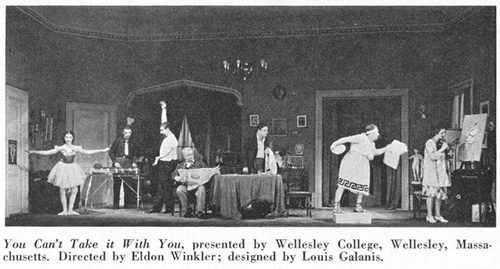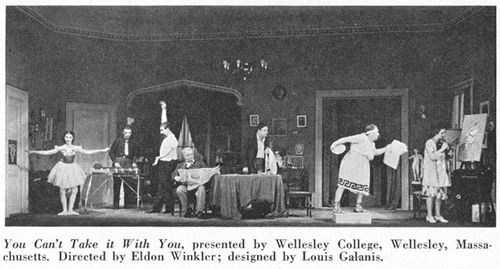The following first appeared in a 1948 issue of Players Magazine:
By Joe Zimmerman. Temple University. Philadelphia, Penna.
For most educational theatres, borrowing properties is the most expedient method of securing properties, and the one by which the greatest number and variety of items are made available. Most non-commercial theatres rely primarily on borrowing for their properties. But a good many designers find that borrowing is a good deal of work, and at least in their experience, seems to require a lack of dignity and “professional manner” that is no great argument in its favor.
Borrowing, however, may also be handled as a self-respecting manner of securing properties, with dignity and some pride, if it is done properly. The “art of borrowing” is both a concept and a fairly specific technique.
(a) Remember first of all that if your theatre is fulfilling its proper function, it is contributing at least as much to the welfare of the community as any of the shops from which you wish to borrow. Borrowing need not imply any particular servility of attitude nor expectation of condescension from the lender.
(b) Select at the start of your season those firms or stores from which you wish to borrow. They should include one furniture store, two second hand or “antique” shops, and shops or department specializing in the following things: gifts, lamps, pictures, fireplace hardware, lighting fixtures, silver and china. You might also add to your list the Bell Telephone Company for telephones, the furniture storage warehouse companies, and shops specializing in Mexican, Chinese, or other particular bric-a-brac. In other words, pick the places from which you can borrow to the best advantage and try to make arrangements with them rather than walking the street “to see if you can find anybody who will lend you things.”
(c) Pay a visit to each of these places a number of weeks before your season begins. Introduce yourself, tell them something about your theatre and what it is trying to do, explain your need for community support, and try to get a positive though general statement of interest and encouragement before you mention your need for properties. Then do so only in passing, a statement of the sort of thing you will be needing, and the hope that the store will be able to help you. Most people will readily promise to help you weeks in the future who would certainly refuse if you walked in to borrow items then and there. Incidentally, be sure you’re talking to the manager, not to a salesperson without authority to lend.
The writer, when propping productions, made this tour of calls each fall, although nearly every place on the list had loaned to us during the past year, and the talks had progressed from the request stage to a friendly renewal of acquaintance. Some of the places from which we borrowed made a practice of sending gifts to the prop technician at the close of the season!
(d) Use program credit to the maximum advantage. At the time you borrow or rent, tell the owner that he will be given credit on the program for his merchandise, be explicit in your program copy as to what objects or type of objects came from each lender, and make a regular practice of sending a program after each production to the people whose help was acknowledged, perhaps marking the acknowledgment referring to them in red, or otherwise calling their attention to it. And don’t let the publicity director tell you it’s “unprofessional” to use acknowledgements on the program!
One theatre had tried for some seasons to persuade a particular shop which specialized in used furniture of the better styles to rent to them without success. Finally they managed to persuade the manager of the shop to rent them a used parlor suite. A patron of the theatre called the shop, remarked that she had seen the furniture in the theatre and had noticed their name in the acknowledgement, and told the manager that as soon as the suite was returned she wanted to buy it. The manager was converted, and the theatre rented for a number of years on the strength of that one bit of evidence. If the device seems sufficiently sure-fire, it will surely justify the expenses of adding a piece to the theatre collection.
(e) Every theatre box office system should be set up to provide a number of complimentary tickets which may be used for the purpose of borrowing properties. If that is impossible, the property budget should permit buying the tickets for persons who lend to the theatre. A surprising number of store managers whose personal incomes might make the theatre itself envious are delighted to get “free tickets.” And a good many private individuals who would be insulted if you offered them two dollars for the use of their parlor suite are delighted to receive a pair of tickets.
Naturally, the great value of complimentary tickets to property lenders is the interest in the theatre which seeing the productions fosters in these lenders. Any property technician will be able to borrow more, oftener, and more easily, if he borrows from a friend of the theatre who is interested in it and looks forward to the next production than from a department manager who has no idea of the work you are doing. Some lenders are frequently not interested in accepting or using tickets. If the theatre wishes to continue to borrow from them for a period of years, they are worth converting. Similarly it is a mistake, if properties are allowed ten complimentary tickets per production, for example, to simply give tickets in exchange for props which are borrowed for that particular show. Use all of the property allowance for every show; first to the people from whom you borrow for that show, then to your more regular lenders whom you don’t happen to be using this time, and finally cultivate potential lenders whom you may want to begin to use next season.

(f) When you call to pick up the properties which have been arranged for, go prepared with furniture pads to protect large pieces and corrugated boxes of newspaper in which to wrap and pack small items. Show the lender that you are accustomed as a regular matter of practice to take better care of his property than he exercises himself. Return the items promptly, the day after the close of the production unless that is absolutely impossible, similarly packed and protected, and check off each item separately on your detailed list. Always, without any exception and however embarrassing, point out any damage the items have sustained, indicate your own regret, and if you honestly can, the rarity of such accidents, and insist upon paying for the damage or buying the entire piece, depending upon the extent of damage. Most firms will appreciate your honesty. All will appreciate your business-like responsibility.
Ordinarily, do not attempt to repair damage yourself; even if you do an excellent job, don’t try to return the object and conceal the fact that it has been damaged. Occasionally, both for your reputation and your theatre stock, you may find it better to simply buy small items than have been nicked or scratched rather than to inform the owner that they have been damaged. Particularly standard items —bookends, bric-a-brac, vases — may easily be repaired so they are satisfactory for stage use and relieve the theatre of the necessity of borrowing such items in the future.
(g) At the close of each season, a well-phrased letter containing a restatement of the theatre’s gratitude should be sent to each renter and lender. This is very important; it conveys the thanks of the theatre in black and white over the signature of the staff member to individuals who will be considerably more favorably disposed to the theatre the next season.
(h) Use purchases to reinforce your good relations with your lenders and renters. Every theatre should continually make additions to its property stock as it does to its scenery and wardrobe supplies.
Making such purchases can have a double value, because the store from which you buy fifty dollars worth of goods will then generally lend you goods worth many times as much. Strained relations between theatre and lender can many times be smoothed over if the theatre buys an item that it has been needing for months. More than the profit is involved; firms seem to appreciate a theatre that is trying to add little by little to its capital stock while borrowing when it must, much more than the theatre which proposes to continue more or less as a parasite for the rest of its existence.
Nor should the property technician or designer overlook the influence of their own purchases. They can make their property job much pleasanter and easier by simply buying whenever possible from firms which lend to the theatre, and letting the firm know and understand the connection between the individual and the theatre. Such a statement may be made politely and diplomatically as a means of explaining recognition or renewing acquaintance, or as incidental conversation, but the effect is not lost upon the firm which must cultivate good will to live.
Many, though not all of these same techniques apply to borrowing from private homes. which many theatres may need or wish to do for specific objects, though borrowing from firms is better as a general practice. The firm stands to gain more from lending than does an individual, and will be considerably less inconvenienced by lending a dining room table or a living room suite than will most homes.
Zimmerman, Joe. “Beg, Borrow, Buy, or…â€Â Players Magazine, Mar. 1948, pp. 131–133.





